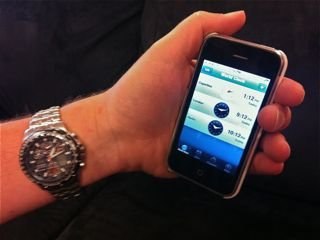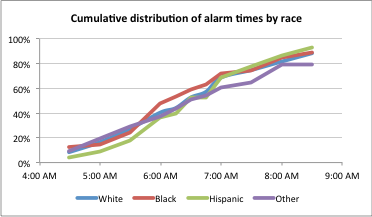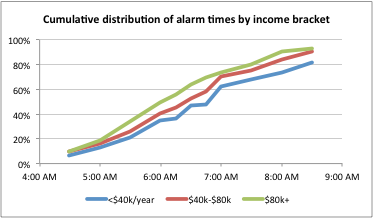Like many people, I wear a watch to tell the time. That people wear watches is something I take for granted but my daughters don't; they exclusively use their mobile phones to determine the time. Recently we were having lunch at a California ski resort on a beautiful spring skiing day. It was warm enough that most people were in t-shirts and as I looked around enjoying the sunshine I quite randomly realized that most of the young people nearby were not wearing watches. Now the watch business is an enormous global business dominated by famous brands: Rolex, Seiko, Swatch, and many others. Could these classic consumer businesses be shrinking as new generations buy fewer watches? On returning to the office I set about answering this simple question. As I started drafting the questionnaire though I started thinking about people's basic relationship with time.
We surveyed 1200 people on YouGov's US panel about watches and another 586 about alarms. Sure enough my casual observation was proven correct; younger people are less likely to own a watch than older people:
| Gender | Age | Race | ||||||||
|---|---|---|---|---|---|---|---|---|---|---|
Own 1 or more watches | 78.2% | 77.3% | 78.9% | 68.8% | 76.5% | 89.5% | 77.7% | 74.5% | 83.1% | 81.8% |
Do not own a watch | 21.8% | 22.7% | 21.1% | 31.2% | 23.5% | 10.5% | 22.3% | 25.5% | 16.9% | 18.2% |
Now, just because a person owns a watch doesn't mean that they wear it:
Are you currently wearing a watch?
| Gender | Age | Race | ||||||||
|---|---|---|---|---|---|---|---|---|---|---|
Asked of those | ||||||||||
Yes | 41.1% | 52.2% | 31.6% | 25.8% | 44.7% | 49.5% | 44.4% | 26.4% | 43.4% | 28.7% |
No | 58.9% | 47.8% | 68.4% | 74.2% | 55.3% | 50.5% | 55.6% | 73.6% | 56.6% | 71.3% |
So now we're down to a mere 32% of the population who are actually wearing a watch! How are people telling time?
How do you normally tell time?
| | Gender | Age | Race | |||||||
|---|---|---|---|---|---|---|---|---|---|---|
| ||||||||||
By looking at my watch | 37.2% | 43.3% | 31.5% | 25.8% | 39.5% | 46.7% | 38.0% | 29.2% | 52.2% | 26.9% |
By looking at my cell phone | 37.1% | 36.7% | 37.4% | 58.7% | 35.2% | 15.9% | 33.4% | 52.3% | 37.0% | 46.5% |
By looking at a clock | 21.1% | 14.9% | 26.8% | 12.8% | 22.6% | 28.4% | 24.0% | 13.9% | 5.4% | 22.4% |
By asking others | 0.0% | 0.0% | 0.0% | 0.0% | 0.0% | 0.0% | 0.0% | 0.0% | 0.0% | 0.0% |
I'm rarely concerned | 3.1% | 4.4% | 1.9% | 0.7% | 2.2% | 6.8% | 2.7% | 4.6% | 5.4% | 1.6% |
Other | 1.6% | 0.7% | 2.3% | 2.1% | 0.5% | 2.3% | 1.9% | 0.0% | 0.0% | 2.6% |
The mobile phone has already caught up to the watch as the go-to timepiece of choice! In the 16-34 age bracket it's the choice of almost 60% of people. Interestingly, no one admitted to primarily asking others for the time. Younger people are more concerned about the time than older generations. Another interesting piece of data is that among those wearing a watch, 8.1% normally tell time by looking at their mobile phone.
Digital vs. Analog?
76% of people's primary watches (asked of those who owned at least one watch) are analog only. 16% are digital and the rest have a hybrid display. The surprise here is that hispanics are much more likely to have digital watches (34%) than other races.
Timepiece or Fashion Statement?
70% see a watch primarily as a timepiece, 14% see it primarily as jewelry, and 16% see it as a fashion accessory. People who didn't own a watch were more likely to see a watch as a fashion accessory (22%).
Now Wake Up!
Ever since I got my iPhone I've been using it as my alarm clock, both at home but especially when I travel. Figuring out the buttons and dials on hotel room alarm clocks late at night when I'm tired and I really need to get up early to catch a flight is just no fun. The iPhone has a great alarm clock that always works (assuming the battery is charged!).
We asked respondents how they wake up to see how this basic time behavior is evolving with the generations.
To help yourself wake up, do you...
| | Gender | Age | Race | |||||||
|---|---|---|---|---|---|---|---|---|---|---|
| ||||||||||
Use an alarm clock | 23.3% | 24.5% | 22.1% | 26.5% | 25.6% | 18.1% | 23.9% | 18.8% | 26.0% | 22.9% |
Use a clock radio | 14.9% | 14.3% | 15.4% | 11.6% | 15.8% | 16.5% | 15.1% | 16.0% | 13.3% | 12.6% |
Use an alarm on your cell phone | 26.3% | 26.2% | 26.4% | 48.1% | 26.3% | 9.2% | 24.9% | 26.8% | 30.9% | 35.0% |
Use an alarm on your watch | 0.1% | 0.3% | 0.0% | 0.0% | 0.0% | 0.4% | 0.2% | 0.0% | 0.0% | 0.0% |
Use some other alarm/wake-up aid | 3.6% | 3.4% | 3.7% | 3.4% | 4.3% | 2.9% | 3.9% | 2.4% | 6.5% | 0.0% |
Wake up without the use of an alarm or other aid | 31.8% | 31.2% | 32.3% | 10.5% | 28.0% | 52.8% | 32.1% | 36.1% | 23.3% | 29.5% |
Here again we see how important the mobile phone is to the younger generation: 48% of those 16-34 use an alarm on their cell phone compared to only 26% of those 35-54 and 9% of those over 55. Older people are also much better at waking up on their own, without an alarm.
We also asked what time of day people had their alarm set to. This led to some fascinating data shown in the charts below.
- Men wake are more likely to wake up before 7am than women
- Younger people wake up later than older people
- There are only minor differences by race
- Those with higher incomes are more likely to be up earlier than those with lower incomes. I look forward to seeing some interesting theories in the comments about which direction the causality runs and why.
|
|
You Snooze You Lose
Finally we wondered about the infamous snooze button:
- Women hit the snooze button slightly more than men
- Younger people hit the snooze button much more than older ones
The Downside of Watch Batteries
Finally we asked our respondents who owned watches how many of these had dead batteries. The answer? A startling 72%. This may help explain why they aren't being worn.











